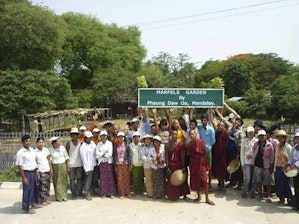
from 17 January 2017
Christian: Ilse and I took part in a private group tour to Myanmar twice in 1998 and 1999. Ilse became especially interested in Buddhism, leading to the second trip.
We also visited Mingun on the Ayeyarwady River, considered a tourist attraction because of its 50 metre high uncompleted pagoda and the largest undamaged bell in the world. Upon our arrival, young girls welcomed us as tour guides and “postcard sellers”, who already divided up the tourists among themselves at the shore before the ship docked. At the second trip, the girls from the previous year recognised us and we realised that they no longer went to school because they were contributing to the family income by guiding tourists. Thus, the starting point for our 17 years of development aid work were four girls whom we wanted to support with some English lessons. This developed into Ilse placing more than 700 sponsors for children to date.
Soon after (after returning) we contacted our friend Oliver Esser (now: So Thet), who is married there and was the manager of a beach hotel. Now, he is the president of the National Association of Chefs, which means that he has close ties with the Ministry of Hotels and Tourism. Because of him, we were immediately introduced to the chef and the wife of the general manger at the Mandalay Hill Resort on our next trip. She welcomed us with the words: Tomorrow morning I will go to the monastery school. Be ready at 7.00 am, I'll take you!
Meeting U Nayaka
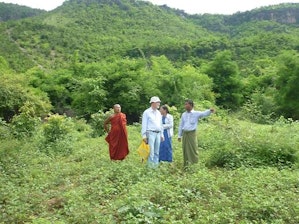
This is how we met Abbot U Nayaka, who in 1993 decided to provide free education to children from poor families on the green field. We have been supporting the Phaung Daw Oo (PDO) monastery school since 2001. Today it has 8000 students, which makes it far too big actually.
U Nayaka is a highly respected figure in Myanmar and especially in the area of the monastery schools. No one would think of opposing the wishes of such a high-ranking monk. The new president honoured him with the Excellence Award. Recently, there was a report on TV in which U Nayaka was referred to as the Dalai Lama of Myanmar.
Ilse: In the beginning, we were committed to teaching English to the four girls. Despite the fact that English is taught in the higher classes of the schools and they also learned the language through tourists, their knowledge of English was fragmented. For their lessons, they had to come from Mingun to the school in Mandalay because it is not possible to commute between Mandalay and Mingun. In the beginning, they stayed with relatives of U Nayaka at our expense. Later on, we bought a second-hand residential barrack that was erected on the school campus and U Nayaka assigned a woman teacher to stay with the girls and teach them from sunrise to sunset, in addition to the official school hours. These four girls had only completed four years of primary school and then had a gap of three years. With extensive tutoring, they were able to make up the six missing school years in two and a half years.
One of these girls was Thandar, our sponsored daughter, who has also visited us in Saarbrücken by now and has learned German very well. When we talk on the phone, we only speak German. She studied social sciences, is married, has one child and has now become our most important contact person. It all works partly because Abbot U Nayaka is approving everything.
Needless to say, we also have a friendly, almost family-like relationship with the parents of U Nayaka. For Buddha says, You shall honour your parents. There was no visit to the school without us immediately greeting the parents of U Nayaka.
Mission for the PDO
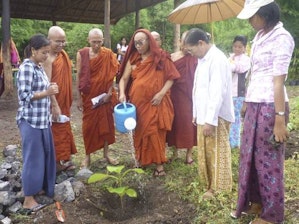
Christian: In addition to the public schools, there are private Buddhist schools in Myanmar. U Nayaka has now called for them to be included in the state funding as well. U Nayaka is also very open-minded with contacts all over the world, in Australia, in England, in Switzerland (Pestalozzi Foundation), etc.
Ilse: We flew to Myanmar twice a year for a work assignment of two weeks. This was mostly in February and autumn, the best months in terms of climate in Myanmar. In the first years, Christian once flew alone. In the last few years, I always went along.
Forms of cooperation
Christian: When I arrive after the long journey, I have the first meeting with U Nayaka and his senior staff, even before I go to the hotel with my luggage. I present my ideas and visions and we discuss how to proceed. U Nayaka carries a big book with him and when a point is discussed, he makes a note in his book. This is the sign for everyone that he accepts my proposal. His staff could then carry out all the necessary work without having to ask U Nayaka every time for further details.
The discussions sometimes continue in Burmese for a longer period of time. I would sit next to it, get in line and judge by the tone of voice whether everything is going well.
Ilse: Without Thandar, it wouldn't have worked out like this. Picking us up at the airport, she already talked to U Nayaka on the phone during the one-hour drive and when we arrive at the school campus, U Nayaka is already standing at the door to greet us with a bright smile. Thandar is an absolute confidant for us and we are like parents to her. She wouldn't do anything without us. For example, she also did not marry without first obtaining our consent (also regarding the date).
Christian: When Thandar's language skills were not that good, I brought in Win Aung. When he told me that he had suspended his studies and was therefore not allowed to continue, we wrote to his professor at the time and asked him to let him continue because of the importance of his involvement in our projects.
Religious motives
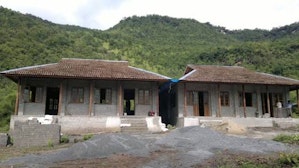
Buddhism teaches that a person should improve their karma through good deeds, so that there are no negative repercussions when they are reborn. Thus, one life follows the other. Only when you enter nirvana does this stop. It is understandable, therefore, that in 1993 he decided to run the classes free of charge. It came to a point where military personnel treated in the school clinic we set up did not have to pay anything. Everything had to be free of charge.
Ilse: As a result, Dr. Frido Wolf, who supported the school clinic, did not want to accept that we should pay for the clinic and that the officers of the military dictatorship of the time should not have to pay anything. This was not about the abbot keeping the funding for himself. He lives quite sparsely; it all goes to the school. We do not even need to consider that money could be misappropriated.
Multiple construction locations
Christian: The first building project we organised for the school was a three-floor boarding house for girls. That was the first proposal to the BMZ, the Federal Ministry for Economic Cooperation and Development of Germany. The first project is usually limited to €50000 – including a co-payment of 25%, but this is waived if you do the loading yourself when transporting a container – which we did.
For the construction projects, it is a great advantage that U Nayaka has permanently employed an architect and a construction manager, who then commissioned construction teams for the various projects. This way, there was no need to hire a general contractor and we could also have all the windows, doors, beds and other wooden parts made by a retired master carpenter from Ottweiler in Saarland, who was running a training course with young people, at cost price. Hörmann later contributed a larger amount to a carpenter's workshop.
My building designs were devised by the architect Chan Chan and then reviewed by our friend Jakob Schilling, an architect in Zurich, who then also carried out the structural calculations.
At the very beginning, when we still had very little funding available, U Nayaka asked me if I could establish a school clinic for him. Because if a child gets injured, they have to be taken to a clinic with a teacher. This costs time and money. In response to me asking, he showed me a barracks that might be suitable for this purpose. I drew the floor plan and then set the necessary things in motion when I got back home. Everything worked out and years later we built a multi-floor building for it.
And even with the improvements to the orphanage, the sanitary facilities and the extension of the kitchen, we never needed a government construction permit. Monasteries in Myanmar can build a pagoda at their own discretion. As a result, monastery schools are allowed to construct school buildings without state permission. For us this also means that we have to take care of the statics.
Influence of the military government at the time
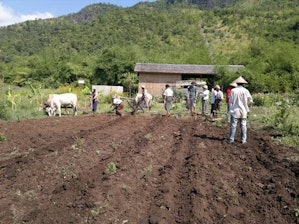
Christian: The government has tried several times to influence the non-profit development aid associations and drafts for regulations have been presented according to which we would only be allowed to travel in the country under governmental supervision. But it never came to that.
On 11 September 2001, when the two skyscrapers of the World Trade Center fell victim to the terror attacks, I was in Yangon with a container of 100 used computers that our association had received as a gift from a subsidiary of the Saarbrücker Zeitung newspaper. The daily newspaper “The Light of Myanmar” reported that, according to foreign press reports, Myanmar was also involved in this terrorist attack. I was accompanied by a computer specialist arranged by SES Bonn (Senior Expert Service), who was supposed to help me install the computers and who took this opportunity to try out his new GPS device. We noticed that domestic monitoring agencies were following us (more or less inconspicuously) to check on our activities. Ilse informed me about the TV programmes by phone, but with no knowledge of the Burmese language, I could not yet understand the connection.
Today, we can transfer our funds via bank, as U Nayaka keeps an account at the Foreign Trade Bank in Yangon. Previously, we had to take the money with us in cash. I still remember being checked at the airport by an old man, obviously quite poor, to whom I had to show the large amount of 100 dollar notes I had carried in my pocket for our projects during an extensive body search. However, nothing had happened then either.
Whenever we carried a large amount of teaching material in our suitcases, we could rely on letters from U Nayaka during inspections. On one occasion, larger things were involved and U Nayaka had acted in advance. Upon our arrival, there was a senior officer in white uniform at the airport control who took note of us: a quick wink and we could pass through without being checked.
Types of funding
Teaching methods
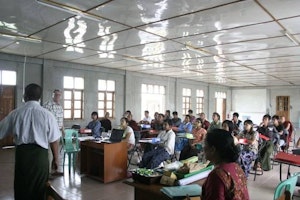
Christian: When I turned 75, I decided to get away from the day-to-day business of the office and continue to devote myself to individual projects. That went well. I continued to fly to Myanmar twice a year and worked in coordination with my successor.
Ilse: I am hitting the brakes a little bit. I need to know that the money is there. Christian is the visionary. But there is no vision that has not been realised. Everything has been accomplished. Of course, there were never any funds from Myanmar. We brought it from here, initially in our pockets. It was an adventure, but it went well. The houses we construct for the school are in line with the country's customs.
It is very difficult. Anyone who knows PDO realises that the teachers also need to be sponsored. Efforts have been made to improve the performance of the teachers through additional teaching. Still, the teaching method at the PDO remains memorising. Despite better training for teachers, this remains the case. Memorising is difficult to replace.
Christian: I too was and am of the opinion that the education system at school needs to be changed. After the reunification of Germany, there was an article in the newspaper by the then President Ten Singh. It referenced the German dual professional training system. The existing system only recognises the secondary school degree and then possible a university education. The failure rate is 50 – 70%. The subject of study cannot be chosen, it is imposed.
New beginning outside the PDO
Christian: I told myself that we would continue training even without a secondary school degree. There is a six-month waiting period between the secondary school degree and the start of the university programme anyway. In these months, young people can do something in the field of horticulture.
The lessons were originally supposed to take place in the school garden. The school garden was also used to provide food for the school. With just a few square metres of land, a Burmese family can provide for itself all year round.
Ilse: However, U Nayaka wanted to establish a new building on the premises of the school garden, which Christian actually wanted to expand even more. Today, the PDO school is desperately cluttered. There is no space left.
In 2010, U Nayaka was gifted a plot of land outside the school. He left it to us. We should make something of it. This is where we established the training centre. Horticulture and arboriculture did not work out. We had already tried this in Mingun. At first, the women were very enthusiastic, but once they really got down to work, they said: The vegetables are so cheap at the market.
Better control of tree planting should have been done there. We were told that such and such a number of trees were planted, but this ultimately was not the case.
Now we have many fruit trees: bananas and papaya. We have a huge harvest, a papaya abundance. At first, I thought it was useless. However, we now see that there is a lot of fruit to harvest. This proved very beneficial last year.
Christian: In our opinion, it makes no sense for a student to study for three or four years and then sit there and not get a job. At that point, they still have to rely on handouts. In contrast, our students earn their living. That is our goal, at least.
For me, the establishment of a dual professional training system without a secondary school degree is crucial. Just to give you an example: A student from Mingun failed her secondary school exams three times. This means that she has lost three years. Then she passed, in fact with a good result. But she was missing a few points for the admission to law school, which she wanted to enrol in. But then she had to study physics. There was no possibility to switch. After three years of studying physics, she now sells beer to tourists at a stall in Mingun.
We are offering dual professional training programmes for four years now at the external campus of the PDO, the Marfels Ground. In that regard, we are independent. However, we still have an office on the PDO campus, which is run by Thandar. U Nayaka also likes to visit us. He is proud of the achievements and likes to show them off to others.
Marfels Ground
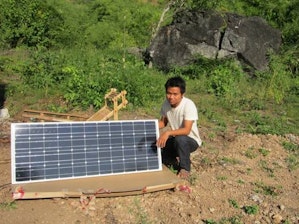
We also secured electricity for the nearby village when we expanded Marfels Ground. In Myanmar, there are still 30000 villages without electricity. We are currently also constructing a water tower. We want to demonstrate to the neighbours that an electric pump is not always needed for water supply.
Marfels Ground was just wilderness when we started in 2011. It was not even barren land. I thought Christian was crazy to start there of all places. But today it is a model project.
Christian: We need to be licensed as a private school institution. That has not happened yet. Two television stations reported on the last course.
I approached the Saarland Minister of Education and asked him if he would like to visit our project in the future. The State Institute for Pedagogy and Media is located here. The deputy leader would like to participate in the next trip and report on it. It would be nice if the Saarland would step up and show how it's done.
We also have another project in mind. Our plot is adjacent to a river coming from a hydroelectric power station and having a strong current. A Burmese took matters into his own hands and slowed down the river a bit to set up a swimming area. He is impressed with us and U Nayaka. We would like to construct a model hotel in connection with the recreational area he has created. This could be our next sponsorship project.